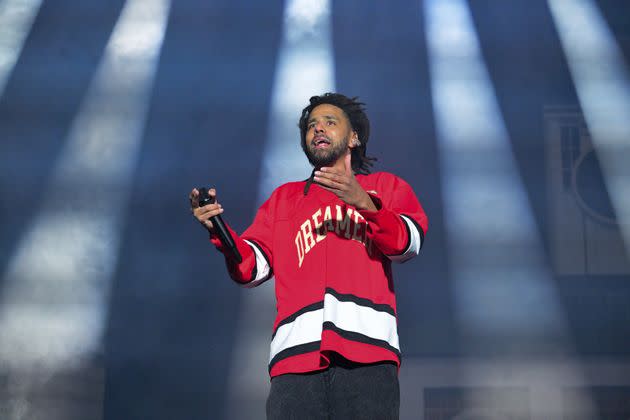It's 2024, And Hip-Hop Still Has A Toxic Masculinity Problem
- Oops!Something went wrong.Please try again later.
- Oops!Something went wrong.Please try again later.
- Oops!Something went wrong.Please try again later.
- Oops!Something went wrong.Please try again later.

During a show at his own Dreamville festival in North Carolina this month, J. Cole did the unthinkable: He apologized for participating in a rap beef.
It was the latest leg of the most interesting thing to happen to hip-hop all year: Kendrick Lamar came from out of nowhere talking slick in his guest verse on Future and Metro Boomin’s “Like This,” insisting that he’s the only one who matters of the alleged “Big 3” rappers of their generation ― the other two being Drake and Cole.
Cole responded two weeks later on “7 Minute Drill” from his surprise mixtape, “Might Delete Later,” with several bars criticizing the Compton rapper’s highly lauded album catalog. As is the case with any good hip-hop feud, folks spent the weekend assessing the bars and staking their sides.
But then Cole threw everyone the hell off with on-stage mea culpas, claiming that his heart was never truly in the battle and that he feels terrible about the whole thing.
“And I pray that y’all forgive a n***a for the misstep and I can get back to my true path,” he said. ”’Cause I ain’t gonna lie to y’all, the past two days felt terrible.”
It was at once the worst thing to happen in hip-hop and… the most grown-up thing I’ve ever seen happen in hip-hop.
Genre fans are justifiably disappointed to see a beef between two bona fide lyricists fold like this, but I take issue with one of the most popular male rappers of a generation who’s being expressive and open about his feelings being considered “soft,” mainly because homophobia and perceived “softness” are often bedfellows in hip-hop, and the homophobia has been loud of late thanks to the House That Sean “Diddy” Combs (Allegedly) Built.
Though the manifold allegations against Diddy are serious and should be perceived as such, much of the dialogue has taken a homophobic bent as the world analyzes both his sexuality and that of his alleged “targets.” Meek Mill has been on the receiving end of allegations that he canoodled with Diddy, placing him in a position in which he feels he needs to defend his manhood… loudly and ridiculously, lest anyone doubt for a second that he’s straight.
Though plenty has been written about hip-hop’s homophobic underbelly, it’s no longer the Wild West of the 1990s or early 2000s, when the biggest hip-hop stars in the world could get away with using the F-bomb on wax. Nas uses it brazenly from the track “Halftime” from his magnum opus, “Illmatic,” but he’ll never rap the word onstage again. Growth.
Hip-hop certainly benefits from the sensibilities of the younger generation, which helps folks like Lil Nas X, who kinda-sorta fits into the genre and who had one of the biggest singles in the last decade. That he couldn’t succeed as he is 25 years ago is movement in the right direction. And yet, for reasons unknown, people continue to platform Boosie Badazz as he spews his homophobia and toxicity despite him not releasing a song that has mattered since Barack Obama was in office.
In 2018, when Migos was one of the biggest bands in the world, Offset rapped “I do not vibe with queers” and sparked a conversation that didn’t happen when Jay-Z rapped “Cause f****ts hate when you gettin’ money like athletes” in 2001, when he was the biggest rapper. That conversation is progress, just as is younger Black men embracing therapy while our grandfathers would only be dragged in by our grandmothers at the risk of losing them.
It’s also progress for Cole to publicly admit his feelings in a genre known for male braggadocio ― no matter how much it pisses folks off.
So, did Cole bring us closer to a hip-hop nirvana not defined by toxic masculinity? It’s a start, but we would also do better if Black folks stopped evoking the “they” as a grand scheme to “emasculate” Black men every time a rich, famous Black man wears exactly what he wants to wear. We’d also do better by curbing the strong foothold that misogyny still has in hip-hop, as it’s still perfectly acceptable to refer to women as “bitches” on wax.
Cole’s response, while viscerally upsetting to some grown men who suddenly feel strongly about the sanctity of hip-hop beef, is a step in the direction that, hopefully, will enlighten us all and teach us to be better about expressing ourselves.
As far as the sport of hip-hop: Well, Kendrick won. No way around that.
